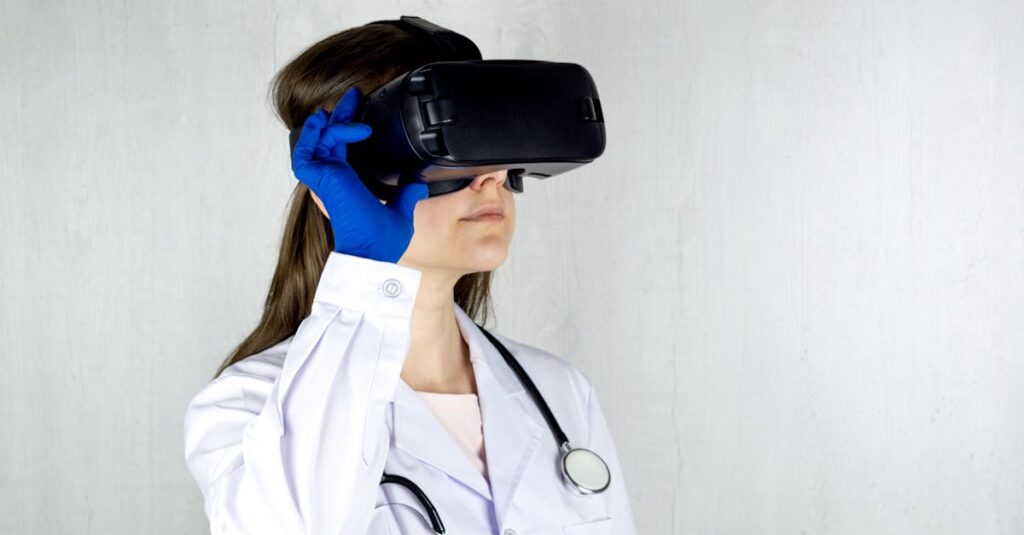Introduction: A New Era in Healthcare
Imagine walking into a doctor’s office and instead of a human doctor examining you, an AI-powered system takes over, analyzing your symptoms, reviewing your medical history, and even suggesting the best possible treatments. This may sound like something out of a sci-fi movie, but it’s happening right now. Artificial Intelligence (AI) is transforming healthcare in ways we never thought possible, revolutionizing how we diagnose, treat, and care for patients.
AI in healthcare is no longer just a futuristic idea. It’s becoming a fundamental part of everyday medical practices, making healthcare faster, more accurate, and personalized. But how exactly is AI changing the patient care experience? Let’s break it down.
AI’s Role in Diagnosis: Faster and More Accurate
When you visit a doctor, the first thing they do is listen to your symptoms, maybe run a few tests, and then arrive at a diagnosis. While doctors are highly trained, they are still human, and human error can happen. In fact, studies have shown that misdiagnosis is a significant problem, with many patients being incorrectly diagnosed or missing critical information that could impact their health.
Here’s where AI steps in. AI-powered diagnostic tools are improving accuracy by analyzing vast amounts of medical data far quicker than any human could. For example, IBM’s Watson for Health can analyze a patient’s medical records and match their symptoms with thousands of medical studies, historical data, and clinical trials to suggest potential diagnoses.
Take the case of a woman who had been experiencing severe abdominal pain. After seeing multiple doctors, her condition remained undiagnosed. However, an AI-driven system recognized the unusual pattern of symptoms and suggested a rare condition that was later confirmed through tests. Thanks to AI, this patient got the diagnosis she needed before the condition progressed too far.
AI in Radiology: Detecting Diseases Earlier
Radiology is another area where AI is making a huge impact. Doctors use imaging techniques like X-rays, CT scans, and MRIs to detect conditions such as tumors, fractures, and infections. But reading these images is a highly specialized skill, and even the most experienced radiologists can miss critical signs, especially in complex cases.
AI is helping doctors by automating the process of analyzing medical images. Algorithms can now examine images with incredible speed and accuracy, often identifying signs of disease before the human eye can. For instance, AI systems have been able to detect early-stage lung cancer with greater accuracy than radiologists, allowing for earlier and more effective interventions.
Consider the case of a patient who came in for a routine chest X-ray. AI software detected a small, previously undetected tumor, leading to early intervention. The patient went on to receive treatment that may have been less effective had the tumor been missed until it grew larger.
AI in Personalized Treatment Plans
One of the most exciting aspects of AI in healthcare is its ability to create personalized treatment plans. Traditional treatment often involves a one-size-fits-all approach: the same medication or therapy for everyone with the same condition. But what if there was a way to tailor treatments specifically to an individual’s genetic makeup, lifestyle, and preferences?
AI can analyze a patient’s genetic information alongside their health data to suggest the most effective treatment options. This approach is known as precision medicine, and it’s a game-changer. By examining the data of thousands of patients, AI can identify patterns that would be impossible for doctors to notice on their own. It can then suggest treatments that are more likely to be effective based on the patient’s unique biology.
The Promise of AI in Drug Development
AI isn’t just helping with diagnosis and treatment; it’s also speeding up the process of drug development. Historically, developing a new drug could take years, even decades. AI is significantly shortening this timeline by predicting how different compounds will react in the human body. This can help pharmaceutical companies develop drugs that target specific diseases more effectively and with fewer side effects.
For example, AI has been used to discover potential treatments for diseases like Alzheimer’s and cancer. By analyzing vast datasets from clinical trials, AI models can identify promising compounds that might have taken years for researchers to uncover on their own. This not only accelerates the process but also opens up new possibilities for treating diseases that have long been considered untreatable.
AI in Healthcare: Enhancing Patient Monitoring
One of the most exciting applications of AI in healthcare is in patient monitoring, particularly for those with chronic conditions. Patients with diseases like diabetes or heart failure often need constant monitoring to prevent complications, but frequent hospital visits can be tiring, expensive, and sometimes unnecessary.
AI-powered wearables are making it possible to monitor patients from the comfort of their own homes. These devices collect data on vital signs like heart rate, blood sugar levels, and oxygen saturation, sending it in real-time to healthcare providers. If anything unusual is detected, the AI system can alert both the patient and their doctor immediately.
For example, a diabetic patient might wear a smart device that continuously monitors their blood glucose levels. If the device detects a sharp spike or drop, the system can send an alert to both the patient and their healthcare team, allowing for prompt intervention. This kind of continuous monitoring can help prevent medical emergencies before they happen.
Challenges and Ethical Considerations
As exciting as AI’s potential in healthcare is, it’s not without its challenges. One of the biggest concerns is data privacy. With AI systems relying on vast amounts of patient data, ensuring that this data is kept secure is crucial. Additionally, there’s the question of accountability. If an AI system makes a wrong diagnosis, who is responsible? Is it the healthcare provider who implemented the system, or the company that created the AI software?
Another concern is the potential for bias in AI algorithms. If the data used to train these systems isn’t diverse enough, the AI could make decisions that are biased toward certain populations. For instance, if an AI diagnostic tool is primarily trained on data from one ethnic group, it may not perform as well when diagnosing patients from different backgrounds. This could lead to disparities in healthcare outcomes.
Conclusion: Embracing the Future of AI in Healthcare
Artificial Intelligence in healthcare isn’t just a trend,it’s a revolution. From improving diagnostic accuracy to personalizing treatment plans, AI is making healthcare faster, more effective, and more accessible. While there are challenges to overcome, the potential benefits far outweigh the risks. As AI continues to evolve, it will undoubtedly play a key role in shaping the future of healthcare.
So, what can we take away from all this? Embrace the future! AI is not replacing doctors; it’s enhancing their ability to care for patients. The more we integrate AI into healthcare, the better the outcomes for everyone involved. The revolution is already underway, and it’s only a matter of time before we see even more breakthroughs that will transform patient care in ways we never imagined.

